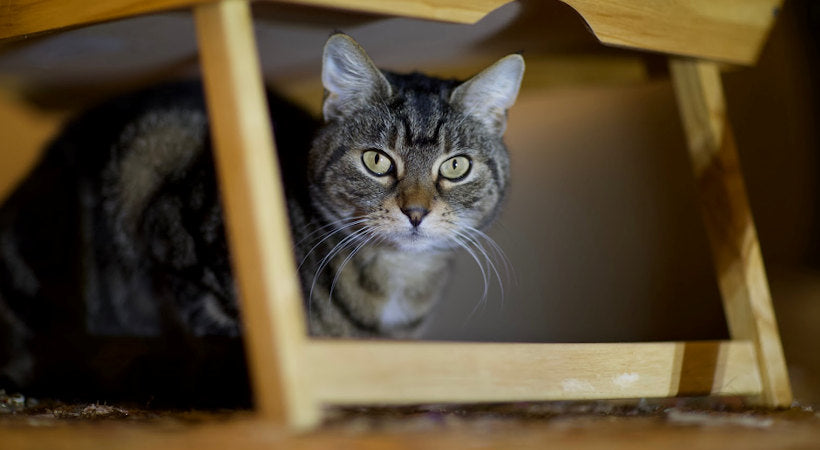Great Dane Lifespan: How Long Do Danes Live? (Life Expectancy)

Why Do Cats Hide?
Cats and hiding seem to be synonymous concepts. Cats like to hide. There is, of course, an evolutionary reason for the prevalence of cat hiding. Hiding helps wild cats find prey and remain safe.
And while our pet cats do not need to catch their own food, most still hide frequently. It is hard to combat that portion of a cat’s instinctual behavior. Cat hiding is not actually a problem most of the time. But, if your normally social, happy cat has taken to hiding, that may be a sign of a bigger issue.
Let’s examine the psychological reasons behind cat hiding and how you can help your kitty feel as comfortable as possible.
The Psychology Behind Cat Safe Places
Hiding is an instinctual behavior for cats. However, every cat is an individual, so some will hide more often than others. Cats that hide all the time likely do not have anything wrong. They hide because it makes them feel comfortable and safe. As long as you provide them with appropriate hiding places and monitor them for any major behavioral changes, they can hide to their heart’s content.
However, if your cat has never been a hider and suddenly takes to hiding, it can be a sign of a problem. There are three main reasons your cat may suddenly hide more often:
1. Sickness or Pain
Behavioral changes, such as excessive hiding, can be a sign that your cat is ill or in pain. Cats tend to be stoic animals. So, noticing behavioral changes are an important way for us to discover health problems in our beloved pets. A cat's natural instinct is to hide their pain symptoms, which means it's up to their owner to pay attention to any change in their cat's behavior. If your cat suddenly begins hiding, take note of other behaviors and their overall health. They may have the flu or a cold or something more serious may be going on.
2. Feline Stress
Cats do not deal with stress well. They are very sensitive to a number of stressors, which can cause them to go into hiding. A new animal or baby in the home, a move, loud guests, all of these situations can cause a cat to hide more often. Typically, the cat will hide for the duration of the stressor and then come back out once they are comfortable again. If they do not reappear in a short period of time, you should consider taking them to a vet.
3. Pregnancy and Birth
Female cats will seclude themselves when they are pregnant and about to give birth. If you suspect your cat is pregnant, providing a box for your girl as she gives birth is important. Otherwise, sudden seclusion by hiding may be a sign that your home is about to gain more feline companions. Typically, a pregnant cat will begin to hide during the final week of their pregnancy and can be a good indicator that your cat is about to give birth.
Providing Hiding Places
It is always important to monitor any behavioral changes in your cat. Your veterinarian can help you determine if your cat’s hiding is a major problem. If it is not, then providing your cat a place to hide is the correct option.
Providing a hiding place for your cat is safer and more comfortable. For example, a cat cave will help regulate your cat’s body temperature. A hiding place your cat discovers may not be as comfortable for them.
Additionally, cats are not always great judges of safe hiding locations. They may decide to hide in a location that puts them in danger, such as in your dryer. Give them their own box, cave, or a basket to hide in. They will be much happier, and you will not struggle to find them.
Helping a Hiding Cat

Hiding cats do not necessarily need help. If the cause of their hiding is obvious, such as a move to a new environment or addition of another animal, giving your cat some time alone is probably the right decision. Provide a safe space for your cat to deal with their issues and let them reemerge on their own time.
However, you may want to take your cat to the vet if there is no obvious reason for their behavioral change. If they have begun hiding for no reason, pay special attention to their eating, drinking, grooming, urinating, and defecating habits. These behaviors can provide clues about whether your cat is healthy or needs to be examined by a professional.
Final remarks
Cats can be amazing companions. They are often playful and loving. Not all cats are very social, and some are more susceptible to stress than others. One thing they all have in common is that they all hide.
Hiding can be positive for a cat’s psychology. It provides them a safe space to be alone, quiet, and comfortable. Where hiding becomes a problem is when it masks another, more serious, problem. Always pay close attention to your cat. If you are worried about their hiding habits or any other aspect of their health, contact your vet immediately.










